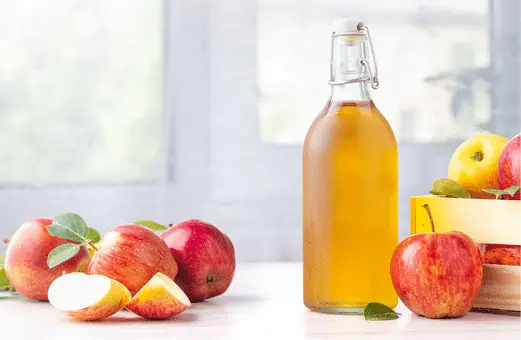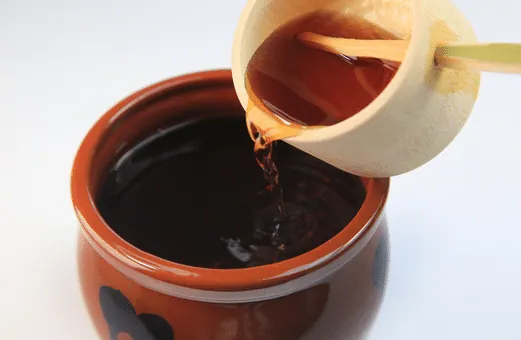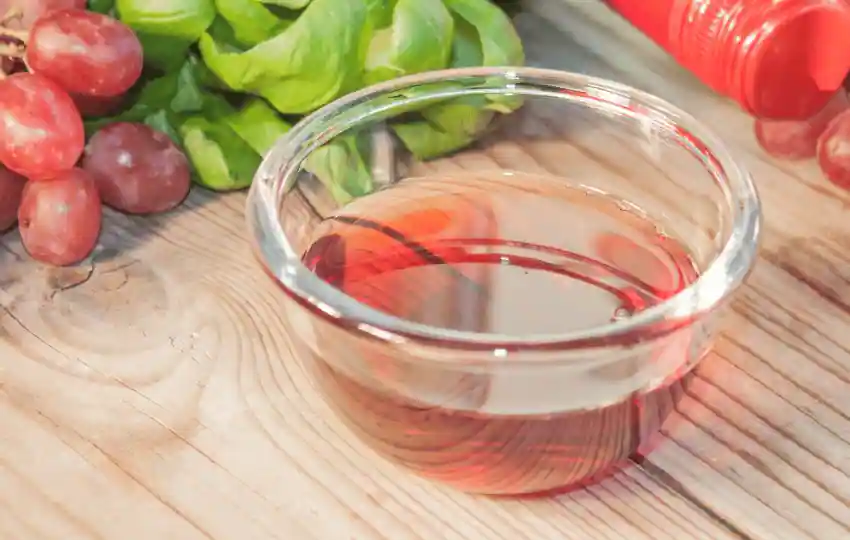Red wine vinegar is a typical ingredient in many recipes, providing a tart, acidic flavor that can add depth and complexity to dishes.
But what should you do when you don’t have any red wine vinegar on hand?
Fortunately, there’re plenty of substitutes that can provide similar results. Let’s glance at some of the best options.
What is red wine vinegar? What does red wine vinegar taste like?
Red wine vinegar is a culinary staple that adds a distinct flavor to different kinds of dishes.
Produced by letting red wine ferment and oxidize, this vinegar offers an acidic yet sweet taste that enhances the overall character of certain food items.
Trying to imagine what it tastes like? Think of the taste of a tangy, mildly tart red wine!
Red wine vinegar has a bright bouquet with notes reminiscent of cranberries and green apples, which can make it an interesting addition to your kitchen cupboard.
What is red wine vinegar used for in cooking?
Red wine vinegar is used as a marinade to tenderize meat, it adds acidic contrast to rich sauces, and it can be substituted for plain white vinegar in dressings and vinaigrettes.
Its acidity also makes red wine vinegar an excellent choice for pickling vegetables or preserving fruits.
Red wine vinegar can even help counter the sweetness of certain dishes, making it an ideal match for items like fruit salads or creamy pasta dishes.
Best Alternatives To Red Wine Vinegar
1. Apple Cider Vinegar
Apple cider vinegar (ACV) is one of the most popular substitutes for red wine vinegar. Its mild acidity and sweet-tart taste make it perfect for many delicious dishes.
If you’re looking for an even milder flavor, try white balsamic or champagne vinegar as well. All three are excellent options for salad dressings and marinades.

Just be aware that apple cider will give your dish an added hint of sweetness, so adjust the other ingredients accordingly when using it as a substitute for red wine vinegar.
2. White Wine Vinegar
If you’re out of ACV, white wine vinegar is also a great substitute for red wine vinegar.
White wine vinegar tends to be lighter and less acidic than its red counterparts, so be sure to adjust the amount of vinegar used in your recipe accordingly.
White wine vinegar also works well in your fish dishes, sauces, and vinaigrettes.
3. Lemon Juice
Lemon juice is another common substitute for red wine vinegar because it has a similar tartness and acidity level.
However, it does have its own distinct flavor profile that might not work as well with certain recipes.
For example, lemon juice would work better in a Mediterranean-style dish than it would in an Italian-style dish, where red wine would be more appropriate.
Still, lemon juice can help brighten up flavors when used in small amounts!
4. Balsamic Vinegar
Balsamic vinegar comes from Italy and is made from cooked grape juice that’s aged in barrels over several years.
Balsamic has a sweet and tart flavor that works well as a replacement for red wine vinegar in many recipes.
Since balsamic has more sweetness than red wine vinegar, use less sugar or honey when making dressings or sauces with this substitute.
Balsamic vinegar pairs particularly well with salads and marinades.
5. Rice Wine Vinegar
Rice wine vinegar has a mild sweetness, making it great for Asian-style dishes like stir fries and marinades.
It’s also lighter in color than other vinegar, so you don’t have to worry about it changing the look of your dish too drastically when substituting it into a recipe calling for red wine vinegar.
6. Sherry Vinegar
Sherry vinegar has a rich and nutty flavor that’s quite similar to the taste of red wine vinegar. It’s made from sherry, which is an aged wine from southern Spain.

Sherry vinegar has a higher acidity than red wine vinegar, so add it sparingly until you get the desired flavor.
Wrap up on Alternative to red wine vinegar
Red wine vinegar offers an unmistakable tangy flavor that can be hard to replicate if you don’t have any on hand.
Luckily there are several alternatives, such as white wine vinegar, rice wine vinegar, balsamic vinegar, apple cider vinegar, sherry vinegar, and lemon juice, that can provide the same level of acidity without compromising on taste!
So next time you’re in the kitchen looking for an alternative for your beloved red wine vinegar – try one of these options instead!
FAQs on Alternative to red wine vinegar
Q1. What vinegar is closest to red wine vinegar?
The closest vinegar to red wine vinegar is sherry vinegar. Made from aged sherry wine, this particular vinegar has a deep, complex flavor and can be used in the same way that red wine vinegar would be utilized.
It also typically has a lower acidity level than red wine vinegar, making it slightly sweeter with fruity undertones. Sherry vinegar is an excellent choice for marinades as well as dressings and vinaigrettes, although it should be blended with other milder vinegar or oils in order to truly bring out its flavor profile.
Q2. Can I use vinegar instead of red wine vinegar?
The short answer is yes – you can use vinegar instead of red wine vinegar in many recipes. Vinegar has a more acidic flavor than red wine vinegar, which means it will give your recipe an extra kick.
Of course, the flavor and texture of your dish may be a bit different due to the change in ingredients, so make sure to adjust other components of your recipe as necessary. Or why not try experimenting with flavored vinegar like apple cider or balsamic?
These provide more complexity to dishes compared with plain white vinegar and can add subtle notes of sweetness or tartness. Whichever kind of vinegar you choose, knowledge and experimentation are key to bringing out that special something in all your culinary creations.
Q3. Is Balsamic the same as red wine vinegar?
Balsamic vinegar differs from red wine vinegar in a few distinct ways. Balsamic is made from white trebbiano grapes and has a deeper flavor than red wine vinegar due to the grape variety. It also contains less acidity and is aged for a minimum of 12 years, making it much sweeter in taste.
The aging process gives balsamic its naturally dark color, while red wine vinegar typically has more of a reddish hue.
In addition, balsamic is generally higher quality and more expensive than red wine vinegar, which can be regarded as an everyday cooking staple. In conclusion, while similar in some respects, balsamic and red wine vinegar are two very different vinegar that can be used to add unique flavors to dishes.

